| Article ID | Journal | Published Year | Pages | File Type |
|---|---|---|---|---|
| 3348168 | Diagnostic Microbiology and Infectious Disease | 2007 | 7 Pages |
An enzyme-linked immunosorbent assay (ELISA) of thermophilic helicase-dependent isothermal DNA amplification (tHDA) was developed for detection of Helicobacter pylori. The primers targeting ureC were used for the amplification of bacterial DNA by the isothermal digoxigenin (DIG)-labeling tHDA process, resulting in the accumulation of DIG-labeled DNA amplicons. The amplicons were denatured using heat and then hybridized with a specific biotinylated DNA probe, which was noncovalently immobilized on streptavidin-coated microtiter plate. The hybrids were colorimetrically detected by the addition of an anti-DIG antibody HRP conjugate and 2,2-azino-di-(3-ethylbenzthiazolinsulfonate) substrate solution. Results obtained from the gastric biopsy samples showed 90% and 95.7% of sensitivity and specificity, respectively, in comparison with culture results, and 96.6% and 96.8% of sensitivity and specificity, respectively, in comparison with those of the histologic studies. This assay significantly reduces the time needed for the identification of H. pylori and has the potential to facilitate early detection of this gastrointestinal pathogen.
